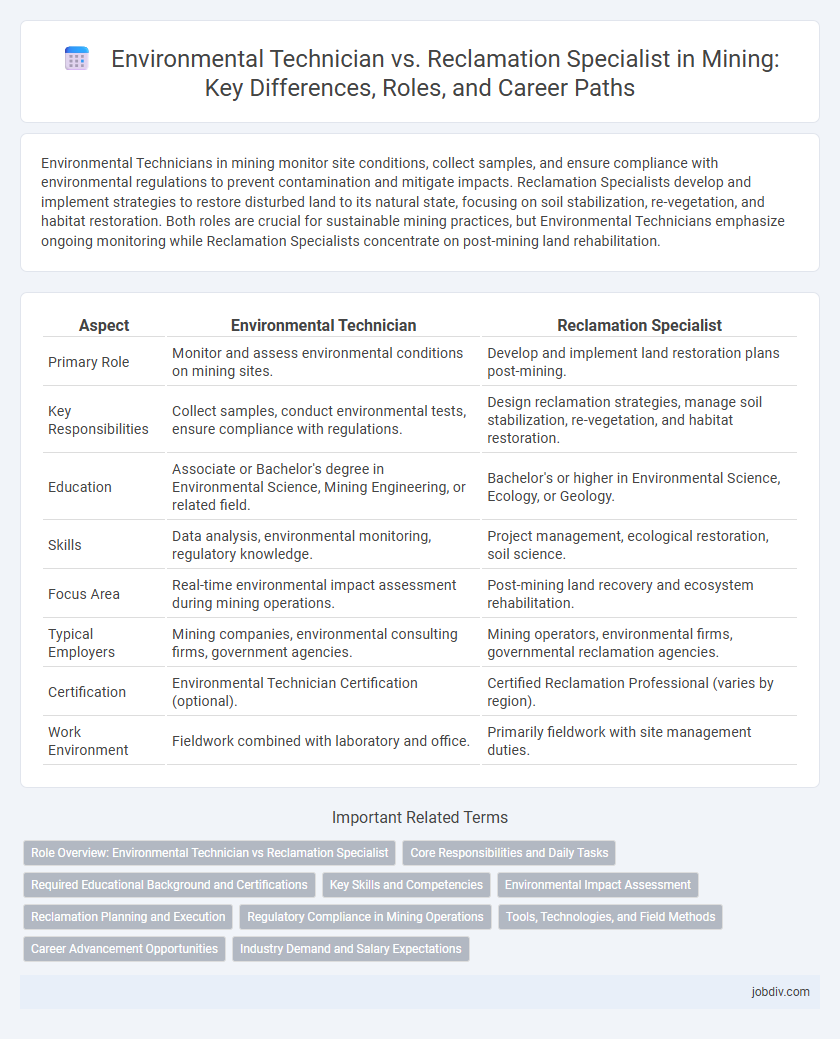Environmental Technicians in mining monitor site conditions, collect samples, and ensure compliance with environmental regulations to prevent contamination and mitigate impacts. Reclamation Specialists develop and implement strategies to restore disturbed land to its natural state, focusing on soil stabilization, re-vegetation, and habitat restoration. Both roles are crucial for sustainable mining practices, but Environmental Technicians emphasize ongoing monitoring while Reclamation Specialists concentrate on post-mining land rehabilitation.
Table of Comparison
| Aspect | Environmental Technician | Reclamation Specialist |
|---|---|---|
| Primary Role | Monitor and assess environmental conditions on mining sites. | Develop and implement land restoration plans post-mining. |
| Key Responsibilities | Collect samples, conduct environmental tests, ensure compliance with regulations. | Design reclamation strategies, manage soil stabilization, re-vegetation, and habitat restoration. |
| Education | Associate or Bachelor's degree in Environmental Science, Mining Engineering, or related field. | Bachelor's or higher in Environmental Science, Ecology, or Geology. |
| Skills | Data analysis, environmental monitoring, regulatory knowledge. | Project management, ecological restoration, soil science. |
| Focus Area | Real-time environmental impact assessment during mining operations. | Post-mining land recovery and ecosystem rehabilitation. |
| Typical Employers | Mining companies, environmental consulting firms, government agencies. | Mining operators, environmental firms, governmental reclamation agencies. |
| Certification | Environmental Technician Certification (optional). | Certified Reclamation Professional (varies by region). |
| Work Environment | Fieldwork combined with laboratory and office. | Primarily fieldwork with site management duties. |
Role Overview: Environmental Technician vs Reclamation Specialist
Environmental Technicians monitor mining sites to collect data on soil, water, and air quality, ensuring compliance with environmental regulations and identifying potential hazards. Reclamation Specialists develop and implement land restoration plans that rehabilitate disturbed mining areas, promoting ecosystem recovery and sustainable land use post-mining. Both roles are critical for environmental management but focus on different phases: active monitoring versus land recovery.
Core Responsibilities and Daily Tasks
Environmental Technicians in mining focus on monitoring environmental conditions, collecting samples, and ensuring compliance with regulatory standards to minimize ecological impact. Reclamation Specialists concentrate on restoring disturbed land by designing and implementing rehabilitation plans, managing soil stabilization, and re-vegetation efforts. Both roles require close collaboration to maintain sustainable mining operations and mitigate long-term environmental damage.
Required Educational Background and Certifications
Environmental Technicians in mining typically require an associate degree in environmental science or a related field and certifications such as HAZWOPER and OSHA compliance training. Reclamation Specialists often hold a bachelor's degree in environmental science, biology, or natural resource management, with professional certifications like Certified Reclamation Planner (CRP) or Society for Ecological Restoration (SER) credentials. Both roles demand knowledge of environmental regulations, but Reclamation Specialists usually need advanced education and specific reclamation-focused certifications.
Key Skills and Competencies
Environmental Technicians in mining require proficiency in field sampling, data collection, and environmental monitoring to ensure compliance with regulatory standards. Reclamation Specialists focus on land restoration skills, including soil stabilization, vegetation management, and ecosystem rehabilitation to mitigate environmental impacts. Both roles demand strong analytical abilities, knowledge of environmental regulations, and effective communication with multidisciplinary teams.
Environmental Impact Assessment
Environmental Technicians in mining projects perform detailed Environmental Impact Assessments (EIA) by collecting soil, water, and air samples to monitor contamination levels and compliance with regulations. Reclamation Specialists analyze EIA results to design and implement land restoration plans that minimize long-term environmental damage and promote ecosystem recovery. Both roles are critical in ensuring sustainable mining practices through effective monitoring and systematic site rehabilitation.
Reclamation Planning and Execution
Reclamation Specialists design and implement land rehabilitation plans to restore mining sites to their natural state, ensuring compliance with environmental regulations and sustainability standards. Environmental Technicians monitor site conditions, collect data, and support the execution of reclamation activities but typically do not lead the planning process. Effective reclamation planning requires expertise in soil science, hydrology, and ecology, positioning Reclamation Specialists as key professionals in restoring disturbed mining landscapes.
Regulatory Compliance in Mining Operations
Environmental Technicians in mining focus on collecting and analyzing environmental data to ensure compliance with regulatory standards such as the Clean Water Act and the Surface Mining Control and Reclamation Act. Reclamation Specialists develop and implement land restoration plans that meet legal requirements for habitat restoration, soil stabilization, and ecosystem recovery post-mining operations. Both roles are critical for maintaining regulatory compliance, minimizing environmental impact, and supporting sustainable mining practices.
Tools, Technologies, and Field Methods
Environmental Technicians in mining use portable air and water quality analyzers, GPS mapping tools, and environmental sampling kits to monitor site conditions and ensure regulatory compliance. Reclamation Specialists employ soil testing equipment, heavy machinery like bulldozers and graders, and GIS software to restore disturbed land and implement land rehabilitation plans. Both roles utilize drones for aerial surveying and remote sensing technologies to collect precise environmental data in the field.
Career Advancement Opportunities
Environmental Technicians in mining typically gain hands-on experience monitoring site conditions and managing hazardous materials, which can lead to specialization in environmental compliance or safety management roles. Reclamation Specialists often advance by developing expertise in land restoration techniques and regulatory frameworks, progressing to project management or environmental consultancy positions. Both roles offer pathways to leadership in sustainability programs, with Reclamation Specialists frequently engaging in long-term environmental impact mitigation strategies.
Industry Demand and Salary Expectations
Environmental Technicians in mining are in growing demand due to increased regulatory compliance requirements, with average salaries ranging from $45,000 to $65,000 annually. Reclamation Specialists, vital for restoring mining sites and mitigating environmental impacts, command higher salaries typically between $60,000 and $85,000 as their expertise is essential for sustainable mining practices. Both roles are critical, but Reclamation Specialists earn premiums reflecting their specialized skills and the industry's focus on environmental restoration.
Environmental Technician vs Reclamation Specialist Infographic

 jobdiv.com
jobdiv.com